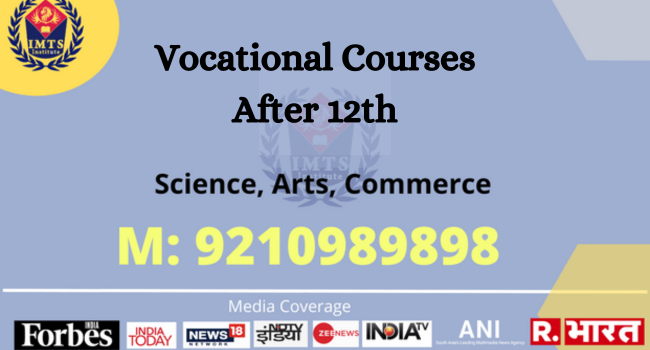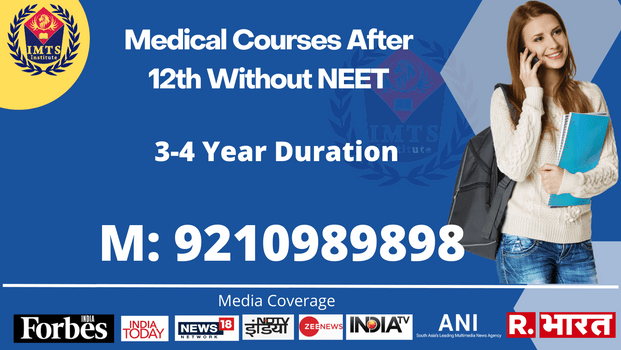Vocational Courses after 12th: Vocational Courses are fully based on specific training, skill, and industry-oriented education. It is different from theoretical and practical based academic courses. Vocational Courses after 12th in a specific trade, help in immediate job findings. Four types of Vocational documents are granted – certificate, Diploma, Advanced Diploma, and Bachelor’s degree in a specific field after 12th grade. The Duration of vocational courses is 1 year for a diploma and 3 to 4 years for a bachelor’s degree.
These courses focus on practical knowledge and hands-on experience, making them ideal for students who prefer a more practical approach to learning. They also provide a route to employment and further education in specific fields.
Latest Admission Updates
- NIILM UNIVERSITY admission open for Vocational course after 12th for the academic session 2025-26. Interested students can fill out the application form by 10 June 2025*. Apply Now
- IMTS Institute Vocational Courses and Diploma courses are offered by IMTS Institute for such subjects as Marketing, Typewriting, and Management of offices after passing the 10+2 class. The Academic year is 2025-26. and the total amount is 12,000/- to 25,000/-. To apply, 12th pass students should pay a fee of INR 500/- till the last date of 10 June 2025. Apply now.
- Subharti University: Accepting the application of the vocational course after the 12th for the academic session 2025-26. Students who pass the 12th with the minimum 50% marks are eligible for this course. The tentative date to apply application is 10 June 2025*.
List of the Best Vocational Courses after 12th
| Courses | Duration |
| B.Voc Logistics Management | 4 years |
| Diploma in IT and Digital Marketing | 2 years |
| Diploma in Engineering (Civil, Electrical, Electronics, or Mechanical) | 2 years |
| B.Voc Medical Laboratory Technology | 4 years |
| B.Voc Banking and Finance | 4 years |
| Diploma in Pharmaceutical | 2 years |
| B.Voc in Bakery and Cooking | 4 years |
| Diploma in Agricultural Science | 2 years |
| B.Voc Retail Management | 4 years |
| B.Voc Software Development | 4 years |
| Diploma in Biomedical Engineering | 2 years |
Eligibility Criteria for Vocational Courses
Candidates have to choose a specific field of the related stream as per their preference. A Separate stream asks for an academic qualification that is different from other streams/specializations.
- Class 12 passed from any valid Board must be for opting for a training-based program.
- Although no percentage is required, candidates should have the familiarity or information about the specific trade that he/she will opt for.
- Trades related to science, Technology, biology, or engineering require a 12th class in the science/computer stream.
- Students enrolled in the 12th class and about to appear in their final board/semester exam are eligible to apply.
- Students must have discipline and skills like – written and spoken communication, teamwork, research skills, etc.
What are Vocational Courses after 12th?
Vocational courses after 12th provide students in specialized training and skill sets to the candidates and prepare them for specific job roles in various industries. The courses focus on practical knowledge and hands-on experience and are for students who prefer a more practical of learning.
Types of Vocational Courses after 12th
Students after the 12th will be able to earn training, internships, apprenticeships, skills, and documents. All these are offered at three types of levels under vocational education. Details Described below is a brief categorization of streams that come under vocational courses at the three levels documents.
After completion of his/her 12th class, students can earn four out of four degrees through a new FYUP Course. The UGC proposed FYUP aims not to waste the learning, time, fee, and future of students even after they drop out of study before its completion. FYUP offers a Certificate after 1 year, a Diploma after 2 years, an advanced diploma after 3 years, and a Bachelor’s degree after 4 years of completion/drop out in a single admission.
Certificate in Vocational Courses after 12th
Certificate courses often are a short-term duration program in a specific trade with skill-based academic knowledge for a job purpose required in a company. It consists of various courses ending in three, six, or eight months to 1-year completion.
List of Vocational Courses after 12th
|
Course Name
|
Duration |
| Certificate in Medical Lab Technology | 1 Year |
| Certificate in Computer Operation (CCC) | 3 Months |
| Certificate course in Yoga | 6 Month |
| Certificate in Plumbing | 6 months |
| Certificate in Language and Translation | 1 year |
Diploma Vocational Courses after 12th
Students after completed class 12th and they want to pursue a career in Diploma Vocational Courses after 12th. A Diploma in Vocational course offers a great path to gain skills and knowledge. Like design, Technology in hospitality and health care. This course provides a hand training and employability.
Some of the demanding vocational diploma streams after the 12th have been named below:
| Stream/Fields |
Duration
|
|
Diploma in Engineering (Civil, Electrical, Electronics, or Mechanical)
|
2 years |
| Diploma in Pharmaceutical | 2 years |
| Diploma in Agricultural Science | 2 years |
| Diploma in Biomedical Engineering | 2 years |
| Diploma in IT and Digital Marketing | 2 years |
Advanced Diploma Vocational Program after 12th
A course designed with in-depth knowledge and a research aptitude on a specific subject with the skills for a particular professional opportunity comes under an Advanced Diploma level study.
The course level can be accessed after the 12th class in the Vocational mode of learning with Internship.
- Vocational Advanced Diploma in IT Networking
- Vocational Advanced Diploma in Product Designing and Modelling
- Vocational Advanced Diploma in Technical and Teaching
- Vocational Advanced Diploma in Computer Courses
- Vocational Advance Diploma in Operation Theater
Vocational UG Degree after 12th
Bachelor in Vocational (B.Voc) is a four-year complete undergraduate degree. It is fully equipped with professional training, skills practiced through internships and Apprenticeships practically on-site learning with research assignments submission.
The Job-oriented bachelor course comprises all professional subjects required in the industries for a job profile.
| UG Vocational Specializations | Duration |
| B.Voc Software Development | 4 years |
| B.Voc Banking and Finance | 4 years |
| B.Voc Retail Management | 4 years |
| B.Voc in Bakery and Cooking | 4 years |
| B.Voc Logistics Management | 4 years |
| B.Voc Medical Laboratory Technology | 4 years |
Vocational Courses Scope
Courses on vocational education are not limited to only those students who are probably in college and school. This type of courses can also be given while on the job. This kind of job-oriented is important for the economy, and ensures that there is no need for training in a future career. With business guidance, labor allocation in the nation can be much better.
In addition, vocational courses give students the edge that they need to succeed in today’s competitive jobs.
- Job Training while studying: This type of course saves time, money, and any supplementary course needed for a job. Students secure their jobs while studying a vocational course, and they do not require any other extra program because they get training and skills that the fields or company require.
- A bridge between Labor Demand and Supply Gap: A huge gap between the labor demand and supply gap is fulfilled by vocational training. The Federation of Indian Chambers of Commerce (FICCI) revealed data that 90% of companies face a shortage of labor and require a skilled workforce but 89% of the population lives unskilled.
- Educational Scope:
- i) Awareness of Vocational Courses calls for a massive campaign. The government of India through its Ministry of Skill Education and Entrepreneurship The Central Board of Secondary Education (CBSE) and other organizations offer Vocational programs.
- ii) Once completed a course in Vocational Education a student can pursue the specialization at a higher level as well.
Salary after the 12th Vocational Course: Salary for a vocational document holder varies based on his/her level of degree, field of industry, experience and skill, etc. Although a professional can pick up a minimum salary of 3 LPA from starting to 18 LPA highest.
Vocational Courses After 12th for Girl
Vocational course after 12th for girls. This course provides knowledge and practical skills in a specific trade. This course is for those students who are seeking a job and skills in various fields like engineering, health sciences, business, design, and more. Admission can be based on a merit list and an entrance exam like CUET and IPUCET.
FAQs of Vocational Courses after 12th
Q: What are the best Vocational Courses after 12th?
Ans: courses like B.Voc Retail Management, B.Voc Banking and Finance, B.Voc in Bakery and Cooking, etc are the best vocational courses.
Q: What is the duration of B.Voc course?
Ans: B.Voc is a three-year duration undergraduate course that can be pursued in the fields of healthcare, food technology and hospitality with the duration of 3 years to complete.
Q: What are vocational qualifications?
Ans: Vocational qualifications are career-based course. Its typically involve a mix of studying and helpful experience in the work. With a vocational qualification you usually don’t have to sit in an exam, or you will get a mix of exams through the year and some coursework.
Q: What is vocational group in 12th?
Ans: Vocational subjects teach skill-based subjects rather than traditional subjects like history, geography, science etc. There are total 39 vocational subjects and among these subjects students can choose the subject as per their interest.
Q: Can I do a vocational course after 12th?
Q: Which course is best after the 12th vocational course?
Ans. There are many vocational courses that are best for the 12th class. Students can pursue the course in which they are interested.
Q: Which is the best vocational course?
Ans. There is no single best vocational course after 12th, depending on your career and goals. A popular course, be as Healthcare, Information Technology, Trades and Skilled Labor, and many more.




